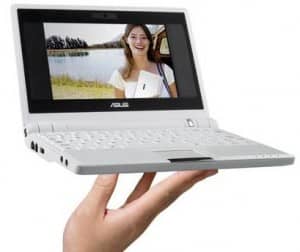 As we approach the end of 2009 let us whisk back quickly in history to the end of 2007. Just two years ago Asus launched the Eee PC 700 and 701 and started the netbook revolution. Previously the PC industry had been moving ahead with only one aim, bigger and bigger, faster and faster. Then Asus realised that you don’t need a dual core processor with 4GB of memory to read your email. And so they launched the small 7 inch screen Eee PC range and started a revolution. But now the same “bigger and faster” disease has hit the netbook and new devices like the fabled Apple Tablet could take their place.
As we approach the end of 2009 let us whisk back quickly in history to the end of 2007. Just two years ago Asus launched the Eee PC 700 and 701 and started the netbook revolution. Previously the PC industry had been moving ahead with only one aim, bigger and bigger, faster and faster. Then Asus realised that you don’t need a dual core processor with 4GB of memory to read your email. And so they launched the small 7 inch screen Eee PC range and started a revolution. But now the same “bigger and faster” disease has hit the netbook and new devices like the fabled Apple Tablet could take their place.
Like the dinosaur netbooks have become too big and too fat. The original Eee PC 700 had a 2GB flash hard drive, 512MB of Ram, a 900 Hz Intel Celeron processor and ran Linux.
Many of the latest netbook models run Windows 7 which has forced the specifications, and price, upwards. And to be honest (except for the screen size) it is hard to see what is the difference between a netbook and a laptop.
The Eee PC started a revolution because it was a device that was bigger than a mobile phone but yet smaller and simpler than a laptop. When netbooks changed from Linux to Windows it was really the beginning of the end for the format. Once you have Windows your mindset changes, you automatically start thinking about a small PC that can do everything your desktop can do and so naturally the hard disk size starts increasing, the installed memory is bumped up and so on. But the original netbook was something else, today the simple idea behind the Eee PC has been lost… Or has it?
Most mobile phones and devices like the iPhone and iPod Touch don’t use Windows and they certainly don’t use Intel processors. Instead they use a group of processors called Arm. The Arm chip is found in the iPhone and it will almost certainly be the processor in the upcoming Apple Tablet. Where there is Arm there isn’t Windows which means that a whole new philosophy can be used. This is what has happened with the iPhone/iPod Touch and the Google Android mobile phone.
The BBC has a quote by Ian Drew, spokesman for chip designer Arm, “We have failed the consumer because we have imposed constraints on them”. The force of change will come, he believes, from the phone world where many, many types of gadgets are already blooming. “It’s no surprise that your mobile has changed a lot in the last three years but your PC hasn’t,” he said.
And this is where Apple’s Tablet comes in. A device to replace the ideas and philosophies of the netbook but with a multi-touch screen and the chic of Apple design.
What do you think? If Apple launch a tablet device, would you buy one?

5 thoughts on “The Rise and Fall of the Netbook: Will Apple’s Tablet Become King?”
definatley im actually asking one for my birthday.
looking at apple’s track record… yes: http://reallychill.org/updates/breaking-news-new-apple-table-islate-is-so-exclusive-ceo-steve-jobs-doesnt-know-about-it/
Constraints can be good. Having a device that only does the 20% of tasks you use 80% of the time is good for speed. It’s worth mentioning that the Eee still wasn’t quite as good as a Psion 3a. The design brief I’d like to set Apple is a computor that fits in my pocket &;
– starts immediatley in what ever application I choose
– has an acceptable keyboard for touch typing
The brilliance of the Psion was it’s instantaneous access to a computor calendar on the move with a half decent keyboard.
If Apple builds it, I’ll buy it. Whatever the cost, to a point. No company in the business builds a better machine that works well, all the time
Netbooks will grow in popularity not decrease and any tech writer who is business savvy would acknowledge that. A more powerful atom processor, extended battery life and cheaper sold state memory, who could resist. Oh I forgot the apple fans who will pay 3 times more for 1/2 the performance. New flash, we are in an economic crunch. College students and those who still have some disposable income will continue to buy ultra lightweight netbooks that will not break the bank